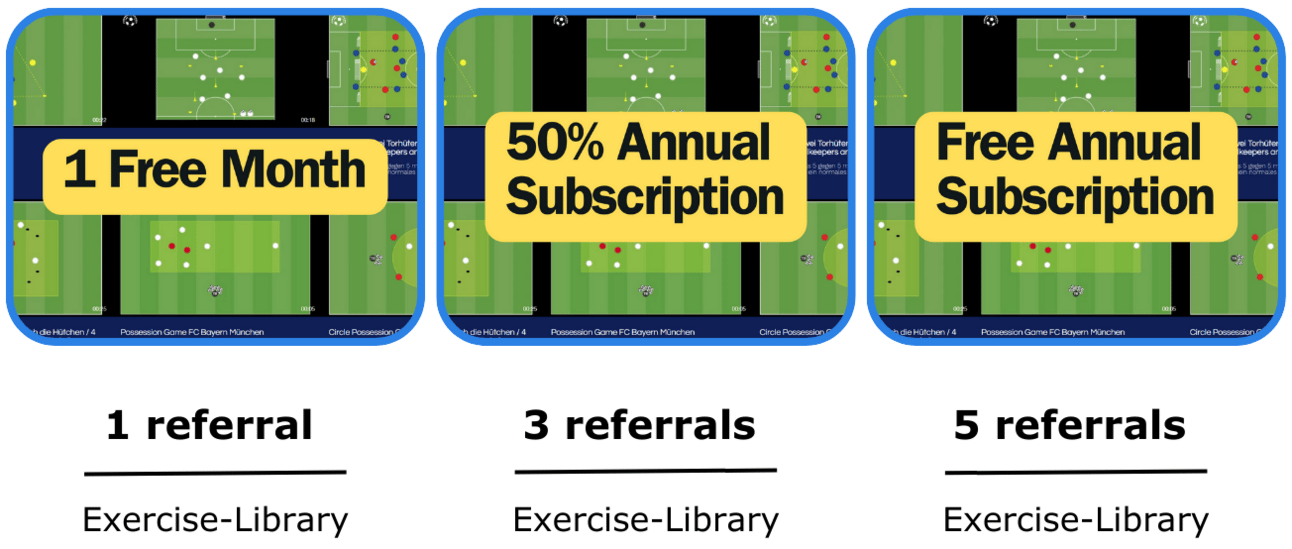Hello and warm welcome to the latest edition of our newsletter! In this issue, the following topics take center stage:
⚽Focusing on Game Principles
👉4 New Exercises!
⚽Focusing on Game Principles
Today, we want to highlight a key topic that can significantly influence the long-term success of your teams: game principles. While discussions often revolve around formations and tactical setups, it's the overarching game principles that truly define a team's playing style and create lasting stability. But why are they so important for us as coaches? How do we develop our own principles? And how flexible should they be? In this article, we'll answer these essential questions.

What Are Game Principles?
Game principles are the fundamental ideas and guidelines your team follows on the field, regardless of formation or tactical adjustments. They define how you want to play football. This can involve how you apply pressure defensively, maintain possession in midfield, or create depth in attack.
A classic example: your team aims to press high and regain possession quickly after losing the ball. This is a principle that works in any formation, whether you're playing 4-4-2, 3-5-2, or 4-3-3. The formation is flexible, but the game principles remain consistent, providing direction for the team.
Why Are Game Principles Important?
Game principles provide consistency and structure. They create a shared understanding within the team and offer players clear guidelines, even in fast-paced or changing game situations. No matter the strength of the opponent or any tactical adjustments made, your players will know what is expected of them. A team with well-defined game principles can make quicker decisions and stay better organized, both in attack and defense.
How to Develop Your Own Game Principles
Developing game principles involves considering several key factors. Here are some important aspects to guide you:
Squad Analysis: The strengths and weaknesses of your players are crucial. Do you have fast and technically skilled players? In that case, a principle could be to focus on quick transitions and short passes. If your team is physically strong, you might develop principles that emphasize physicality and winning duels.
Coach's Philosophy: Your personal football philosophy is also important. What style of play do you want to implement? Do you prefer possession-based football with lots of short passes, or do you favor quick transitions and long balls? Your vision should be reflected in the game principles you set.
Tactical Flexibility: Game principles shouldn’t be rigid; they need to adapt to different situations. For example, if your team usually presses high, you can make adjustments for stronger opponents by pressing slightly deeper. However, the overarching principle remains the same.
Consider Game Phases: Be sure to define principles for different phases of the game: offense, defense, and transition. Every team should know how to act in each phase to maintain consistency and organization.
How Often Should Game Principles Be Adjusted?
In general, game principles should remain consistent to provide players with clear guidance. Frequent changes can cause confusion and weaken team cohesion. However, adjustments are beneficial when:
The squad changes: New players with different strengths and weaknesses may require tweaks to certain principles to ensure they remain effective.
Opponents adapt to your style: If you notice that opponents are consistently anticipating your tactics, small adjustments might be necessary.
The approach stops working: If you're going through a prolonged period without success, it may be worth reassessing whether your principles still fit the current situation.
It's advisable to keep the core principles steady and only make changes when truly necessary. This ensures a stable foundation while allowing the team to rely on a consistent framework over time.
Conclusion
Game principles are the foundation of any team. They provide direction, establish clear processes, and create a unified playing style, regardless of formation or tactical adjustments. Develop your principles based on the strengths of your squad and your own football philosophy—and stick with them as long as they are effective. Minor adjustments and refinements are certainly acceptable, but overarching principles offer your team long-term stability and clarity.
Seeking Support for Your Game Principles?
If you need assistance in developing your game principles, don’t hesitate to reach out to our new community. Share your questions and insights, and let other coaches lend their expertise and support. Engaging with fellow trainers can provide valuable perspectives and solutions that will help you refine your approach. Join the conversation and take advantage of the collective knowledge within the community to enhance your coaching journey!
👉4 New Exercises!
4 new exercises are out. Get unlimited access to all existing and upcoming videos with our monthly or yearly subscription.
Exercises:
⚽Share Fussball Coaches Newsletter
Share our newsletter with friends and family to receive coupons for accessing our training library. 🎁👇
Here’s your unique link to share: {{rp_refer_url}}
{{rp_personalized_text}}
Check out our Homepage for exclusive training videos and products.
Was this post forwarded to you? Subscribe here.
Have an idea or feedback to share? [email protected]






